#Giuseppe Melchiorre Sarto
Explore tagged Tumblr posts
Text
SAINT OF THE DAY (August 21)

Pope Pius X, born Giuseppe Melchiorre Sarto, was the first Pope elected in the 20th century.
He came to the papal office in 1903 and died 11 years later in 1914, just as World War I was beginning.
He was born on 2 June 1835 at Riese, near Venice, and was one of eight children. His family was poor.
He felt a calling to be a priest at a young age and was ordained in 1858.
After 26 years, he was named bishop of Mantua, Italy. In 1893, he became patriarch of Venice.
As Pope, he issued decrees making the age of First Holy Communion earlier (at the age of 7) and advocated frequent and even daily reception of the Eucharist.
He promoted the reading of the Bible among laypeople, reformed the liturgy, promoted clear and simple homilies, and brought back Gregorian chant.
He revised the Breviary and reorganized the curia.
He also initiated the preparation of the 1917 Code of Canon Law, the first comprehensive and systemic work of its kind.
In 1913, Pope Pius X suffered a heart attack and subsequently lived in the shadow of poor health.
In 1914, the pope fell ill on the Feast of the Assumption of Mary (15 August 1914).
It was an illness from which he would not recover. It was reported that he suffered from fever and lung complications.
He died on 20 August 1914 of natural causes, reportedly aggravated by worries over the beginning of World War I.
Pope Pius XII beatified him on 3 June 1951 and canonized on 29 May 1954.
Pope Pius X is the patron saint of First Communicants and pilgrims.
The Society of Saint Pius X, a traditionalist Catholic fraternity formed decades after his death, is named after him.
0 notes
Text

THE DESCRIPTION OF POPE SAINT PIUS X The Patron of First Communicants Feast Day: August 21
"My hope is in Christ, who strengthens the weakest by His divine help; I can do all in Him who strengthened me!"
Giuseppe Melchiorre Sarto, nicknamed 'Bepi' by his family, was born on June 2, 1835 in Riese, Italy, a farming village near Venice. He was the oldest of nine children. We know him today as Pope Saint Pius X. His father, Giovanni Battista Sarto, was a mailman and he died before Giuseppe was ordained a priest. His mother, Margarita, was a dressmaker and lived to see her son become the Cardinal of Venice. Two of his sisters became religious nuns and served under him in the Archdiocese of Venice.
Giuseppe was first in his grammar school class. When he was 11 years old, he told his father that he wanted to become a priest. His father, with the help of their local parish priest, sent Giuseppe to a well-known Catholic high school about six miles outside of town. Giuseppe graduated first in his high school class at the age of 15 and immediately entered the seminary in Padua.
He graduated from the seminary first in his class in 1858 and was ordained a priest, Don (Father) Sarto. He was assigned to Tombolo, a farming village, as an assistant pastor for nine years. Don Sarto flourished with the help of his pastor. He was devoted to the Eucharist, enjoyed preaching and loved young people.
His Masses were reverent, his sermons were carefully crafted and moving and, as the oldest boy from a large, poor family, he was able to relate to the poor youth in his parish. He began an after school program in Tombolo to help children learn more about their faith and develop their reading and writing skills. He also began a similar program in the evening for adults because his daytime program was so popular. Pius X is often credited with developing the foundations of modern catechism and adult education still held in parishes today.
Don Sarto was named pastor of Salzano at the age of 32 and he remained there for nine years until 1876. He was well known for helping poor farmers and cattle ranchers. He helped to fund schools and supported the local hospital when a cholera epidemic affected his parishioners. He rarely slept and so he earned the nickname, 'Perpetuun Mobile'—a machine in perpetual motion.
The Bishop of Treviso realized Don Sarto's talent and energy so he promoted him to Monsignor and other important positions including the spiritual director of the local seminary and chancellor of the Diocese of Treviso. Monsignor Sarto was known for his quick wit and humility and his love of people. He enjoyed teaching, preaching and administering.
Monsignor Sarto was elevated to Bishop of Mantua on November 10, 1884 despite his protestations over not wanting to leave the seminary. He asked the Vatican to reconsider his elevation but the Pope responded with one word, 'obey!'
As Bishop, he encouraged educated and energetic priests. Bishop Sarto adopted St. Thomas Aquinas' teaching methodologies and instituted the Gregorian Chant for Mass. Within six years, the troubled Diocese of Mantua was turned into a vibrant diocese with spirit-filled masses and enlightening preaching.
Pope Leo XIII elevated Giuseppe Sarto to Cardinal on June 12, 1893. Upon hearing the news of his appointment, Cardinal Sarto told a local newspaper that he was 'anxious, terrified and humiliated.' He immediately returned to his hometown of Riese to celebrate Mass for his elderly mother, family and friends. His mother passed away soon after he left for Venice. While Cardinal, Giuseppe continued to encourage education for priests and improved Catholic schools. He also raised money for the sick.
Pope Leo XIII died and Cardinal Sarto reluctantly accepted the position of Pope after a four-day conclave during which he won 55 out of 60 votes. He chose the name Pius because he said: 'As I shall suffer, I shall take the name of those Popes who also suffered.'
His coronation took place on August 9, 1903. During his papacy, Pope Pius was less formal and more approachable than his predecessors. He invited priests to dinner in the Vatican each evening and often snuck out of the Vatican through the garden passageways to visit the sick in local hospitals. He improved priestly formation, instituted improved liturgies and music and insisted on quality preaching from his priests and bishops. He modernized Canon law and introduced progressive scholarship through the biblical institute of Rome under the direction of the Jesuits.
Pope Pius X also lowered the age for young people to first receive the Eucharist and fought against 'modernism,' a theological teaching that he viewed as heresy and atheism. He preached forcefully against war and violence and had visions that a war would break out in 1914 killing many innocent people that turned out to accurately describe World War I. He did not live to see the long-term effects of the war but his prophecies live on. Pope Pius X supported immigrants from Europe who fled to North and South America. He created many new dioceses and appointed new bishops in the Americas.
In the last year of his life, he granted many private audiences with the poor and sick. Rumors of miraculous cures began to spread throughout Rome after people visited him. Two religious sisters who were cured through his prayers confirmed the healings after his death and endorsed his canonization to sainthood.
Pope Pius X died on August 20, 1914. The Italian press wrote, 'Saint is Dead.'
His tombstone is engraved with the words; "Pope Pius X, poor and yet rich, gentle and humble of heart, unconquerable champion of the Catholic Faith, whose constant endeavor it was to renew all things in Christ..."
Source: Church of Saint Pius X - Scarsdale, New York
1 note
·
View note
Text

Pope Saint Pius X
1835-1914
F east day: August 21 (New), September 3 (Trad)
Patronage: First Communicants
Pope Pius X, born Giuseppe Melchiorre Sarto, was the 257th pope of the Catholic Church, serving from 1903 to 1914. He was the first pope since Pope Pius V to be canonized. Pope Pius X is perhaps best remembered for his encouragement of the frequent reception of Holy Communion, especially for children. The second of 10 children in a poor Italian family, Joseph Sarto became Pius X at 68, one of the 20th century's greatest popes.
"Holy Communion is the shortest and fastest way to Heaven." - Pope Saint Pius X
Prints, plaques & holy cards available for purchase here: (website)
31 notes
·
View notes
Photo
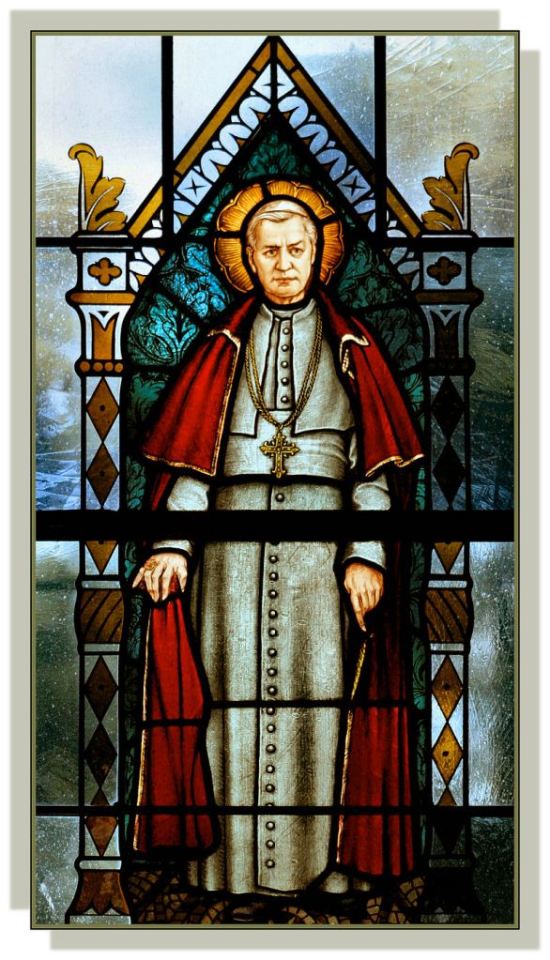
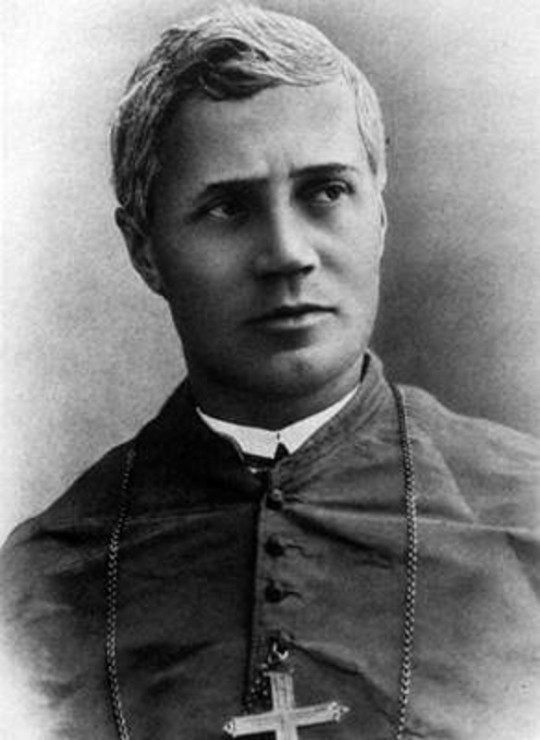
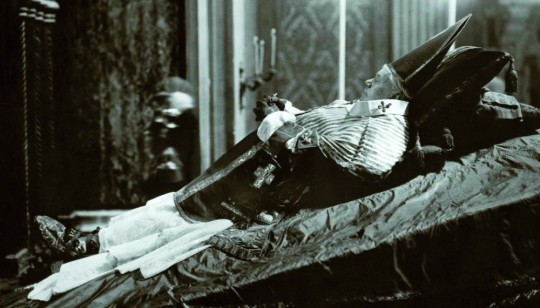


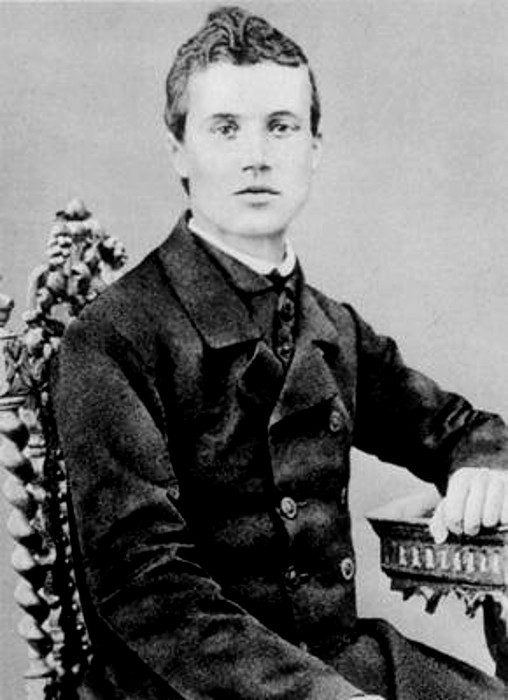
Saint of the Day – 3 September – Saint Pope Pius X (1835-1914) “Pope of the Blessed Sacrament” – born on 2 June 1835 at Riese, Diocese of Treviso, Venice, Austria (now Italy) as Giuseppe Melchiorre Sarto (familiarly known as Joseph Sarto) and died on 20 August 1914 at Vatican City. He reigned from 4 August 1903 until his death in August 1914. Patronages – First Communicants, Catechists, Pilgrims, 7 Diocese, Patriarchy of Venice. His Incorrupt body lies at St Peter’s Basilica. He was Beatified on 3 June 1951 by Pope Pius XII and Canonised on 29 May 1954 by the same Pope.
(via Saint of the Day – 3 September – Saint Pope Pius X (1835-1914) – AnaStpaul)
13 notes
·
View notes
Text

Pío X (en latín: Pius PP. X), de nombre secular Giuseppe Melchiorre Sarto (Riese, 2 de junio de 1835-Roma, 20 de agosto de 1914), fue el 257.º papa de la Iglesia católica desde el 4 de agosto de 1903 hasta su muerte en 1914.
1 note
·
View note
Text
«Combattre la maçonnerie est une oeuvre religieuse et éminemment sociale, parce que cette secte est hostile, non seulement à notre sainte religion dans toutes ses manifestations, mais s’applique à ruiner aussi la tranquillité de l’ordre. Je recommande aux membres de cette ligue de s’intéresser tout spécialement à ces pauvres jeunes gens qui, séduits par d’adroites paroles, se font gloire d’être affiliés à la secte anticléricale, laquelle, sous prétexte de raison et de science, combat directement la foi». Giuseppe Melchiorre Sarto (futur Pie X), le 29 août 1896

1 note
·
View note
Photo

DOMENICA 21 AGOSTO 2022 - 🔸♦️ SAN PIO X° Papa ♦️🔸 Pio X (in latino: Pius PP. X, nato Giuseppe Melchiorre Sarto; Riese, 2 giugno 1835 – Roma, 20 agosto 1914) è stato il 257º vescovo di Roma e papa della Chiesa cattolica dal 4 agosto 1903 fino alla sua morte. Nel 1951 fu beatificato da papa Pio XII; lo stesso pontefice lo proclamò santo nel 1954. È ricordato soprattutto per la difesa intransigente dell'ortodossia della dottrina cattolica, concretizzatasi nella condanna e lotta al modernismo teologico (con l'enciclica Pascendi Dominici Gregis del 1907), e per la redazione del Catechismo Maggiore detto comunemente, appunto, "di Pio X". Da Il Santo del Giorno Tradizioni Barcellona Pozzo di Gotto - Sicilia #Tradizioni_Barcellona_Pozzo_di_Gotto_Sicilia #Sicilia_Terra_di_Tradizioni Rubrica #Santo_del_Giorno (presso Roma) https://www.instagram.com/p/Chg7wdXsMHu/?igshid=NGJjMDIxMWI=
0 notes
Text
San Pio X, l’ultimo papa prima della Grande Guerra
San Pio X, l’ultimo papa prima della Grande Guerra
Il 21 agosto cade la memoria di Pio X, noto anche come Giuseppe Melchiorre Sarto, patriarca di Venezia e il papa che vide l’arrivo della Grande Guerra… Nato a Riese, in provincia di Treviso, il 2 giugno 1835, Sarto crebbe in una famiglia, dove sua mamma, analfabeta, svolgeva piccoli lavori di sartoria, mentre il padre lavorava come fattorino, per mantenere i dieci figli. (more…)

View On WordPress
0 notes
Text
Saint of the Day for Saturday, August 21st, 2021
Saint of the Day for Saturday, August 21st, 2021
St. Pius X Facts Feastday: August 21 Birth: 1835 On June 2, 1835, Giuseppe Melchiorre Sarto saw the light of earth at Riesi, Province of Treviso, in Venice; on August 20, 1914, he saw the light of heaven; and on May 29, 1954, he who had become the two hundred fifty-ninth pope was canonized St. Pius X. Two of the most outstanding accomplishments of this saintly Pope were the inauguration of the…

View On WordPress
0 notes
Link
Giuseppe Melchiorre Sarto, quien luego sería el Papa Pío X nació el 2 de Junio de 1835 en Riese, provincia de Treviso, en Venecia. Sus padres fueron...
0 notes
Text
SAINT OF THE DAY (August 21)

Pope Pius X, born Giuseppe Melchiorre Sarto, was the first Pope elected in the 20th century.
He came to the papal office in 1903 and died 11 years later in 1914, just as World War I was beginning.
He was born on 2 June 1835 at Riese, near Venice, and was one of eight children. His family was poor.
He felt a calling to be a priest at a young age and was ordained in 1858. After 26 years, he was named bishop of Mantua, Italy.
In 1893, he became patriarch of Venice.
As Pope, he issued decrees making the age of First Holy Communion earlier (at the age of 7). He also advocated frequent and even daily reception of the Eucharist.
He promoted the reading of the Bible among laypeople, reformed the liturgy, promoted clear and simple homilies, and brought back Gregorian chant.
He revised the Breviary, reorganized the curia, and initiated the preparation of the 1917 Code of Canon Law, the first comprehensive and systemic work of its kind and the first official comprehensive codification of Latin canon law.
He died on 20 August 1914 of natural causes reportedly aggravated by worries over the beginning of World War I.
Pope Pius XII beatified him on 3 June 1951 and canonized on 29 May 1954.
1 note
·
View note
Text
Suedezul care a creat chimia modernă
Berzelius a descoperit elementele siliciu, seleniu, toriu şi ceriu.
Citeşte şi Mesajul real din pictura ,,Cina cea de taină” a lui da Vinci, decriptat după sute de ani. Cine era Iisus?
Citeşte şi Criminaliştii germani au reconstituit figura lui Mozart. Cum ar fi arătat celebrul compozitor – FOTO
Berzelius a absolvit medicina la Universitatea Uppsala în 1802, devenind profesor, din 1807, în medicină şi chirurgie, la Şcoala de Chirurgie din Stockholm. În 1810 şcoala a devenit o parte a Institutului Medico-Kirurgiska, predecesor al Institutului Karolinska, şi Berzelius a fost numit profesor de chimie şi farmacie. La puţin timp de la sosirea la Stockholm, el a scris un manual de chimie pentru studenţii săi, acesta marcând începutul unei lungi şi fructuoase cariere în chimie.
În timp ce efectua experimente pentru manualul său, a descoperit legea proporţiilor constante, care arăta că substanţele anorganice sunt compuse din diferite elemente în proporţie constantă cu greutatea lor. Pe baza acestei observaţii, în 1828 a creat un tabel cu masele atomice relative (cu oxigenul având valoarea 100) ale tuturor elementelor cunoscute atunci. Aceasta a reprezentat o confirmare puternică a ipotezei atomice: că compuşii chimici anorganici sunt compuşi din atomi combinaţi în cantităţi reprezentate prin numere întregi. Descoperind că masele atomice nu sunt multipli întregi ai masei hidrogenului, Berzelius a invalidat astfel Ipoteza lui Prout, care susţinea că elementele sunt formate din atomi de hidrogen. În 1838, Berzelius a descoperit proteinele. Studenţi lucrând în laboratorul lui Berzelius au descoperit de asemenea litiul şi vanadiul.
Pentru a înţelege mai bine experimentele, el a creat un sistem de notaţii chimice în care elementelor le erau date denumiri simple, literale — precum O pentru oxigen, sau Fe pentru fier — şi proporţiile erau desemnate prin numere. Acest sistem este baza sistemului utilizat astăzi, cu mici modificări.
A fost ales membru al Academiei Regale de Ştiinţe a Suediei în 1808 şi a devenit membru al Academiei Suedeze în 1837.
Descoperă îţi prezintă principalele semnificaţii ale zilei de 20 august:
1741 – Exploratorul danez Vitus Bering a descoperit Alaska
1827 – S-a născut Josef Strauss, compozitor şi dirijor austriac. (m. 22 iulie 1870)
1833 – S-a născut scriitorul Vasile Pogor, om politic, publicist şi poet român, membru fondator al „Societăţii Junimea” (m. 1906).
1833 – S-a născut Benjamin Harrison, a fost cel de-al douăzeci şi treilea preşedinte al Statelor Unite ale Americii pentru un singur mandat între 1889 şi 1893 (m. 13 martie 1901).
1864 – S-a născut Ionel I.C.Brătianu, preşedinte al Partidului Naţional Liberal, de mai multe ori ministru şi prim-ministru, membru de onoare al Academiei Române (m. 24 noiembrie 1927).
1871 – S-a născut fiica regelui Carol I şi a Elisabetei, Maria. A încetat din viaţă de scarlatină la vârsta de 3 ani.
1872 – A încetat din viaţă scriitorul Dimitrie Bolintineanu, participant la revoluţia de la 1848 („Manoil. Roman naţional”, „Elena. Roman original de datine politico-filosofic”) (n. 1825).
1873 – S-a născut medicul internist şi balneolog Anibal Theohari; a pus bazele balneologiei moderne în ţara noastră (m. 5 februarie 1933).
1910 – A încetat din viaţă medicul Nicolae Manolescu, medic oftalmolog şi educator sanitar, întemeietorul şcolii româneşti de oftalmologie (1903-1904) (n. 1850)
1914 – A încetat din viaţă Papa Pius al X-lea (Giuseppe Melchiorre Sarto), a fost Papă din 1903 până în 1914 (n. 2 iunie 1835).
1920 – S-a născut Zoe Dumitrescu – Buşulenga, personalitate a culturii române, cu o prolifică activitate de cercetător, critic şi istoric literar, eseist, filozof al culturii şi pedagog român. (m. 5 mai 2006)
1923 – A încetat din viaţă compozitorul Alexis Catargi (n.17 septembrie 1876).
1930 – A încetat din viaţă Gheorghe A. Dinicu, compozitor, profesor şi dirijor (n. 1863).
1940 – A fost asasinat, în Mexic, Lev Troţki (Lev Davidovici Bronstein), om politic rus, figură proeminentă a revoluţiei din 1905 – 1907 şi din 1917 (n. 7 noiembrie 1879).
2006 – A murit compozitorul Laurenţiu Profeta, printre distincţiile obţinute se numără Marele Premiu al Uniunii Compozitorilor şi Muzicologilor din România în anul 1999, precum şi Premiul de compoziţie „George Enescu”, în anul 1946 (n. 1925)
Articolul Suedezul care a creat chimia modernă apare prima dată în Descopera.ro.
0 notes
Text

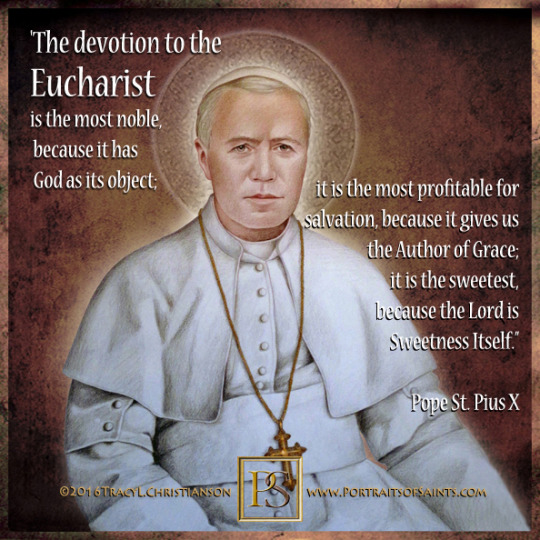
Pope Saint Pius X
1835-1914
Feast day: August 21 (New), September 3 (Trad)
Patronage: First Communicants
Pope Pius X, born Giuseppe Melchiorre Sarto, was the 257th pope of the Catholic Church, serving from 1903 to 1914. He was the first pope since Pope Pius V to be canonized. Pope Pius X is perhaps best remembered for his encouragement of the frequent reception of Holy Communion, especially for children. The second of 10 children in a poor Italian family, Joseph Sarto became Pius X at 68, one of the 20th century's greatest popes.
"Holy Communion is the shortest and fastest way to Heaven." - Pope Saint Pius X
Prints, plaques & holy cards available for purchase here: (website)
55 notes
·
View notes
Photo

『在基督內復興一切!』 . 6月2日知名壽星:聖庇護十世(Pope Pius X ;本名: Giuseppe Melchiorre #Sarto,1835-1914 ;在位:1903-1914) . 羅馬天主教第257位教宗,作為自西元十六世紀以來,首位身後獲得『封聖』(#Canonizatio)榮銜的教宗,他出生在昔日奧地利帝國利塞(#Riese,現位於義大利東北部,已命名為『利塞庇護十世村』)近郊的貧困農家... . 在接任教宗之後,他大力革新教會禮儀,尤其鼓勵信友勤領聖體(聖餐),更將兒童初領聖體的年齡由以往的十多歲提前到七歲;同時,對於推動『天主教法典』的編纂,及鼓勵世人對『聖經』的再次認識與深入研讀,庇護十世也作出重大的貢獻。 . 值得一提的是,對近代天主教教會發展史而言,庇護十世更是一位具開創性的教宗,因為他廢除了行之多年的教宗選舉(樞機閉門會議)『否決權』... . 話說從西元十六世紀開始,有些擁有天主教會友資格的世俗君主,可以被允許行使所謂的『right of exclusion』,或『#veto』,也就是『否決權』... . 根據非正式的常規,每個『國族』(nation)均被允許對一位候選人行使否決權,而任何一個國族做出的決定,則被該國族的樞機之一所傳達。��因為『否決權』只能被行使一次,因此,各國族的樞機直到討論中的候選人將要當選的最後一刻,才能宣布行使該權力。選舉之後,否決權即失效,不再能被利用。 . 簡而言之,就是用政治力量干涉教宗選舉啦... . 西元1903年那年的教宗選舉,奧地利帝國成為了最後一個行使該權力的國族,因為當時的奧地利樞機通知教廷樞機團,奧地利國族反對支持當時聲望最高的樞機拉姆波拉(Mariano Rampolla)出任教宗,因此樞機團最後選出了薩托,也就是庇護十世。他有鑒於世俗力量不應超越神聖的揀選,因此決議廢止了『否決權』,更聲明任何傳達其政府否決權的樞機,日後將受到破門絕罰(開除教籍)的懲處。 . 而面對西元二十世紀初期的諸多新思維和科學至上論調,以及新崛起的帝國侵略主義,教宗除多次責斥抵觸信仰的現代主義與相對主義外,並竭力保護天主教教會的權利免於外界列強們的干擾...而這位號稱保守主義派旗手的教宗,昔日為了對抗『現代主義』滲透天主教會,還曾經要求所有神職人員、教會幹事,或是神學教師等必須要公開宣誓,誓死捍衛聖經真理呢! . 可是主張和平、祈願能讓基督信仰再次復興的他,卻也是第一位親眼看見無知人類爆發世界大戰,憤而鬱悶辭世的西方宗教領袖。 . #教宗 #天主教 #歷史 #6月2日 #義大利 #教會 #history #people #catholic #pope #italy https://www.instagram.com/p/ByM1A-YnPvH/?igshid=1q97gb75qo39s
0 notes
Photo


Aug. 21: St. Pius X (1835-1914), Pope
Joseph Sarto (Giuseppe Melchiorre Sarto) was born in humble circumstances at Riese, a small village in Venetia, on June 2, 1835. He was successively curate, parish priest, bishop of Mantua, Patriarch of Venice — offices to which his keen intelligence, hard work and great piety caused him to be quickly promoted. He was elected Pope on August 4, 1903, and took the name of Pius X. As chief pastor of the Church he displayed untiring self-sacrifice and great energy; he was an intrepid defender of the purity of Christian doctrine. He realized to the full the value of the liturgy as the prayer of the Church and the solid basis that it furnishes for the devotion of Christian people; he worked for the restoration of the worship of the Church, especially plainchant, so that Christian people, as he put it, might find beauty in their public prayer. He spared no effort to propagate the practice, so great an aid to holiness, of early, frequent and daily communion. He died August 20, 1914 and was canonized on May 29, 1954.
His humble background was no obstacle in relating to a personal God and to people whom he loved genuinely. He gained his strength, his gentleness and warmth for people from the source of all gifts, the Spirit of Jesus. In contrast, we often feel embarrassed by our backgrounds. Shame makes us prefer to remain aloof from people whom we perceive as superior. If we are in a superior position, on the other hand, we often ignore simpler people. Yet we, too, have to help “restore all things in Christ,” especially the wounded people of God.
1 note
·
View note
Text
1 note
·
View note